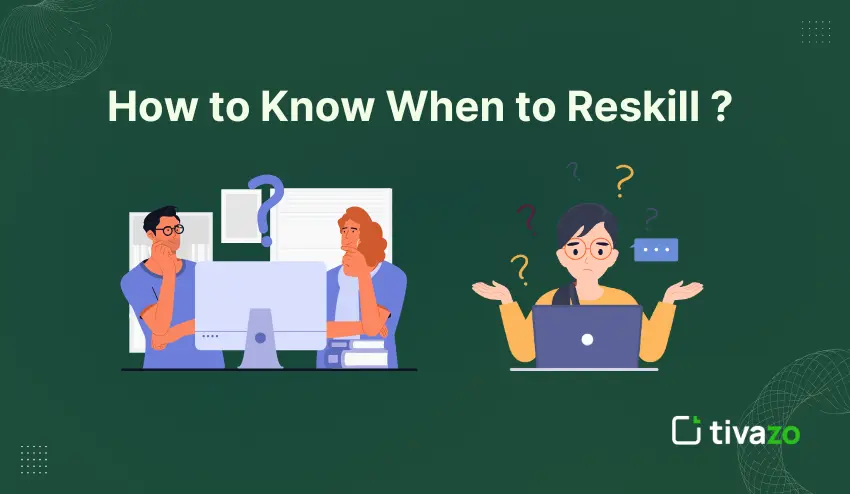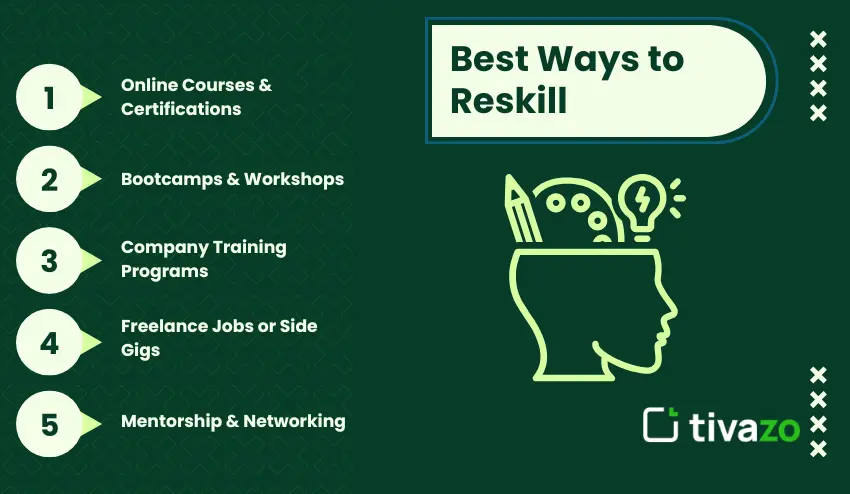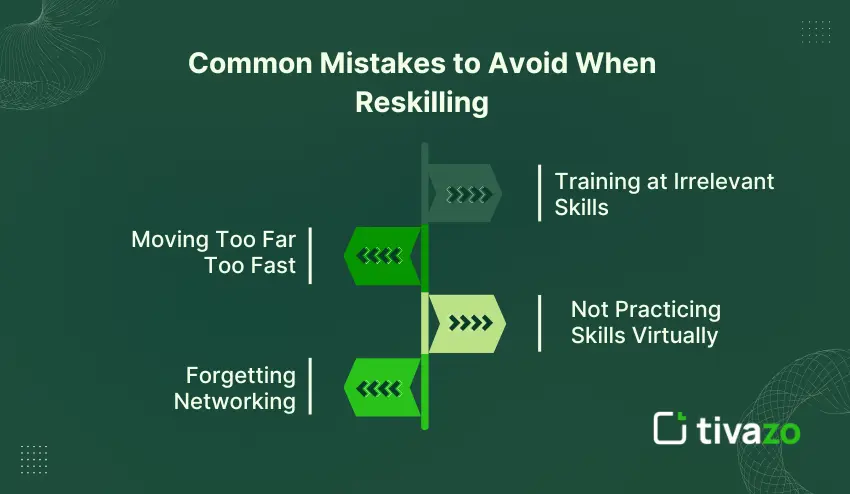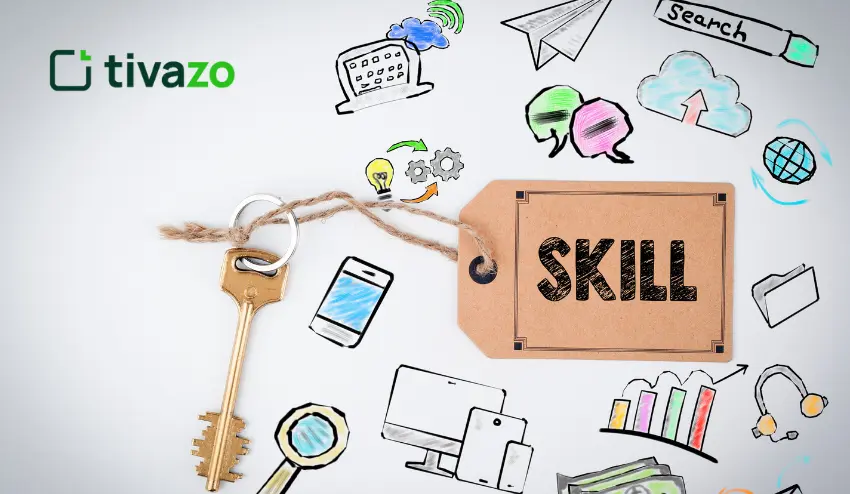The nature of work is evolving at an unprecedented pace. The same work that was secure in 2010 is now being erased, all the as something entirely new develops. The only question is whether or not your skills are prepared to face the future.
To remain relevant you have to reskill. Reskilling involves re-educating oneself on new skills to move into new jobs that are required. Adaptation is no longer optional- professionals that do not adapt risk being left in the dust and only those with an adaptive attitude will be able to unlock new professional opportunities and increase their earning potential.
In this guide, you will learn what reskilling is, the difference between reskilling and upskilling, and what are good reskilling strategies in 2025. You will also receive the information about what career to pursue to be future proof as well as how reskilling and upskilling can make your career more competitive. This blog will tell you exactly what steps to follow so that you can reach your destination, whether that is changing industries, moving upwards in your current career, or future-proofing your career.
What is the Meaning of Reskill?
To reskill is to acquire new skills that can enable you to change career or job. Whereas upskilling involves enhancing what you already know, reskilling is about making a shift to a different direction.
Examples include:
- A cashier who is learning to code in order to move into IT.
- A factory worker who is learning to use logistics software to be a supply chain coordinator.
- A data analytics marketer who wants to advance to a business intelligence position.
Reskilling is the process of adjusting to the changes in the workforce and making sure that your career stays viable as the industries change. This also helps to bridge the skill gap.
What is the difference between reskill and upskill?
These two terms are interchangeable; however, they are used differently.
- Reskill: Obtain new skills to move to a new role or profession. An example is a journalist who has re-skilled to be a UX writer.
- Upskill: Develop the skills you already have to advance your current position. An example is a sales rep who improves the ability to negotiate to make bigger sales.
Consider it in the following way:
- Reskilling = change of direction.
- Upskilling = leveling up where you are.
They are both significant, and it is important to know when to reskill and when to upskill to grow in your career.
Reskill with Upskill: Combining Both for Growth
The best professionals do not view reskilling and upskilling as two distinct options- they employ both as strategies. In this way, they do not only remain relevant in their current jobs but also expose themselves to new career prospects.
Consider a digital marketer as an example of this kind of marketer. They upskill by acquiring data analytics to transition to a more technical position and upskill at the same time in advanced SEO and content strategies. This mixes them into a much more versatile professional and one that would be of high value to their profession and avoid the problem of skill issues.
Advantages of reskilling and upskilling in combination are:
- Stay Competitive in Your Current Position: You develop your current skills and add new ones that will make your position future-proof.
- Open Doors to New Industries: The new skills that you will gain as a result of reskilling will enable you to shift into new industries, which will expand your career opportunities.
- Develop a Flexible, Long-Term Career: The combination of the two allows you to be prepared to meet the changing job demands and be able to adapt to changes.
- Add Value to Your Professional: Employers prefer employees who can not only advance what they are doing but also can bring something new to the business.
Simply put, when professionals reskill using upskill, they are better prepared to manage the current job market, as well as being prepared to pursue new opportunities in the future. This two-pronged strategy is a clever method of remaining competitive in a competitive workforce.
Why Reskilling Matters in 2025
Our work is evolving at a faster pace than ever before. By 2025, technology will have kept changing industries, creating new opportunities in some fields and rendering some jobs obsolete. Knowing these changes happening to our dynamic work environment is important in remaining relevant in the job market.
This is what is taking place:
- AI and Automation: Monotonous work in industries such as finance, customer service, HR, and even some manufacturing processes will be delegated to AI. This does not imply that all jobs are going away, but it does imply that the skills necessary to succeed are changing. Professionals that have the ability to work with technology will be at an obvious advantage
- Green Energy and Sustainability: With the world paying more attention to environmental issues, renewable energy, sustainable design, and environmental management, more jobs in these areas are becoming available. Reskilling toward these areas can place you in industries that have a long-term growth potential.
- Healthcare Tech: Healthcare is no longer medicine and patient care. Medical software development, telemedicine, and health data analytics are becoming important. Employees who upskill to tech-based healthcare jobs will be in high-demand jobs.
- Cybersecurity: With increased migration of business to the internet, the threat of cybersecurity is increasing. Businesses will require trained experts who are able to safeguard information, networks and online resources. Career reskilling in cybersecurity is a viable means to a future-proof career.
- The truth is straightforward: Some occupations will be lost, but a lot of new and interesting opportunities will arise. The only competitive strategy is reskilling, or learning new skills to fit the jobs of the future, and rapidly adjusting to changing market needs.
Reskilling is not only survival but also thriving. It helps you to stay a valuable professional, who is ready to take advantage of the changes as industries change and technology transforms the world of work.
How to Know When You Need to Reskill
You may not notice when it is time to reskill, but there are indicators to keep an eye on. The sooner you can identify them the better it is so that you do not end up lagging behind in your career.

You may have to reskill in case:
1. Your job is being automated
It is a clear indication that the skills you are using may not be sufficient anymore when you see that AI or software is taking over routine aspects of your work. Reskilling can assist you to transition into positions where human skills are still needed.
2. Your sector is contracting or rapidly changing
Industries evolve and some jobs may become obsolete. Monitor the trends in your profession. When demand of your skills is dropping, then you need to look into other areas.
3. There is no room to grow in the career
In case promotions or new opportunities are not available any longer, reskilling can provide access to new roles that are aligned with your career goals.
4. The jobs that are advertised need skills that you do not possess
Read the job advertisements in your industry or the one in which you would like to work. When you see some skills that keep recurring that you lack, then it is a strong indication that you need to learn and change.
The best practice is to make a self-assessment: make a list of your current skills and compare them to the future job requirements, and find gaps. This will assist you in designing a focused reskilling plan and will make your learning efforts more focused where they are needed the most.
Best Ways to Reskill in 2025
Reskilling is like a combination of disciplined learning, hands-on experience, and mentorship. These are the most viable ways of reskilling in the modern job market:

1. Online Courses & Certifications
Platforms such as Coursera, LinkedIn Learning, Udemy, and Google Career Certificates have made reskilling available anywhere. You can study at your own pace, in areas you need most and even get certifications that will boost your resume. Online courses are especially beneficial when you have to combine work and studying.
2. Bootcamps & Workshops
Intensive short-term courses in such fields as coding, UX/UI design, digital marketing, or cybersecurity can enable you to learn practical skills in a short period of time. Bootcamps are also characterised by practical assignments and real-life cases, which means that you are not only taught, but also trained.
3. Company Training Programs
Many innovative employers are providing in-house reskilling programs. These programs assist employees to adjust to new roles in the organization, acquire new technologies or be ready to be promoted. These programs will save you time and provide you with company-sponsored legitimization of your new abilities.
4. Freelance Jobs or Side Gigs
One of the quickest methods of learning is through application of new skills in real life situations. Freelance, side work, or volunteering to take on specific tasks allows you to test your skills, develop a portfolio, and experience, as you learn.
5. Mentorship & Networking
Find out how professionals who already excel in your target field learned to do so, and learn as much as you can from them. Mentors can always be helpful in offering directions, practical advice, and information that is usually not mentioned in online courses. Networking also enables you to know where you can find opportunities where your newly acquired skills are in demand.
Combining these methods, you can develop a reskilling plan that is realistic, effective, and fits your career plans.
Reskilling Strategies That Actually Work
It is easier to reskill with a plan. These are the strategies that will help you stay focused and make progress:
- Know What You Want: Be sure you know the role, field, or skills you are attempting to narrow your learning into.
- Look for Transferable Skills: Communication skills, leadership skills and problem-solving skills are transferable across any career.
- Use Learning Now: You have the skills to work on a project, freelance, or personal work.
- Develop a Routine: Make sure you set aside time for learning each week to keep you on track.
- Have a list of accomplishments: By keeping a list of skills you have used and projects you have completed, you can measure the progress of your learning and determine where you should focus next.
These steps can make reskilling practical, productive, and effective, equipping you with new opportunities with confidence.
Common Mistakes to Avoid When Reskilling
Good intentions are not always sufficient and you can fall into all the usual reskilling traps by committing errors. What to be alert to:

- Training at Irrelevant Skills: Train on skills that are in demand, and fit in your desired positions. Learning skills that do not apply is a waste of time and effort.
- Moving Too Far Too Fast: Trying to learn all of the skills they may want to do is not possible. Rather than striving to be jack of all trades, make one goal at a time a priority and gain experience to be a master.
- Not Practicing Skills Virtually: Theory does not work by itself. Use new skills in real projects, as freelance work or in personal assignments so that the works can stick.
- Forgetting Networking: Relationships count. Talking with mentors, colleagues, and other players in the industry can see you find something in which your new-found knowledge is appreciated.
Future-Proof Careers You Can Reskill Into
Industries to look at in terms of reskilling in 2025:
- Data & AI: machine learning, AI ethics, data analytics.
- Cybersecurity: Hacking ethically, cloud security, risk-based security.
- Medical device: Telehealth, health data analytics, medical software. Professionals pivoting into healthcare can build leadership, operations, and data competencies through the Healthcare Administration MBA, positioning themselves for administrator, practice manager, or health system roles.
- Green: solar technology, sustainable, efficient energy.
- Online Marketing: Search Engine , performance marketing, content building.
- Project Management: Agile, Scrum and remote collaboration management.
Reskilling to go into these professions is the key that opens the doors to secure, well-paying, and sought-after careers
Conclusion
The future of work is changing rapidly and the skills that served you in the past may not be enough to secure your future. Reskilling is no longer just an option it’s a necessity for anyone wanting to remain relevant, continue to develop their careers, and explore new opportunities.
By figuring out when to reskill; utilize reskilling combined with upskilling; and utilize practical strategies, you can take charge of your career and help with professional development. Find in-demand skills, apply what you learn to actual projects, and take advantage of mentors and networking to fast track your development.
Reskilling is not just learning to cope with change but to thrive with change. Those who embrace it will discover they are more adaptable, confident, and able to set themselves up for the careers of the future. If you can, start today. Invest in the skills that will assist you to define your career path in 2025 and beyond.




